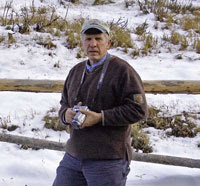Western terrain had long stirred in me a fairly passionate impulse to witness. There were also abiding curiosities that had wanted satisfying. That meant going to look. In turn, that meant taking time which – or so my conscience kept hinting – should’ve been spent on less grandiose enterprises than trying to see what I was part of. On the other hand, a lifetime has always seemed too rare, too surreal an opportunity to throw away on success.
I’m here now [Colorado] perhaps because as a Midwestern boy I’d have loved it but couldn’t. Had no idea. By just hiking here I amaze him.
Heady pine-scent from trees leading the hardest of lives makes me wonder why so much of humanity’s smell is sorrow.
We admire wild places because their forests and mountains meet us as exactly what they meant to be; blessedly forlorn, among many strange ways in which the world keeps its promise.
Sharp as a blade, distant skyline meets the eye through miles of thin air. I listen. A soundlessness whose smallest effect is awe; hermetically pure, a speaking stillness. Like good composers, mountains never play the same silence twice.
Any “This, Here, Now” so entirely taken with being exactly itself can’t help arresting a lone skier, just as any mind that arrives there takes one look and stops mumbling. Stops cluttering itself with thoughts. Hasn’t a name, isn’t anyone. Becomes what it hears: mountain snowfall in which silence ripens.
Why should raw bigness summon the deepest, oldest feelings we life forms can have? Perhaps by the very size of indifference. Because mountains scorn the astonishments they give rise to, because they pretend to live entirely within the limits of the visible, because they despise our memories, we respect the hugeness of their refusal to confide. Which awes us.
Among fellow humans we’re merely superfluous at best; at worst, part of the competition. But winter mountains enlarge the needle’s eye of our tiny brains and their labyrinthine trivialities. Thanks to the rude unity of winter’s fourteen-thousand-foot peaks, we feel our insignificance expand like a strange prestige – which makes being alive a kind of magic, easy as being not quite real. Small wonder that wherever terrain permits, primitives go around filling their habits with mountain gods.
From juniper, as from many another life that water takes on in deserts, I learn the trick of surviving even technology: “Be a tree not worth cutting down.”
Meanwhile I tried very hard to learn every which way a Douglas fir might grow that a white fir couldn’t mimic. And vice versa. It was a process teaching me how much of what we call eyesight is wanting to see. Small wonder that, cytologically speaking, retinal tissue and brain tissue are cousins. Eyes seem to be the mind leaning forward.
… the truth: nature as one self-sufficient machine where anything that can die is called “life”, and ourselves the losses we agree to live out. It’s as if the atmosphere suddenly vanished. Without a vapor of illusion to absorb its lethal radiations, the sun pours down a ruthless clarity denying everything I’d like to be true.
Desert canyons at night are anything but voiceless. Yet peaceful, supremely. In such canyons your own presence can feel like the human race down to one person – which is to exist more actually than any other way I know.
… the more carefully I look at specific conifers, the less apt to their individualities become syllables like “spruce” or “pine” or “fir”.
Thus on a peak whose shattered granite is indeed blunt as ruin, I clamber around gazing off into all points of the compass, then lunch with no other company than the stones’ rude stares – their way of asking, “Why breathe? Why bother? Why come?” … Proud of their mindless immortalities – compared with anything married to oxygen – the massive slabs seem bored with human pretensions.
… that’s the High Southwest. Colored distances like nowhere else I know, unbroken by any made thing. And skies that change you to a person worth being there.
Our grand Western spaces are, instead, an empty plentitude. On the thoughtful person they confer depths beyond any thing humans can ever put there. The middle of nowhere is a power, a moving unity of spirit in us, one that habitation can only break up, never enhance.


No comments:
Post a Comment